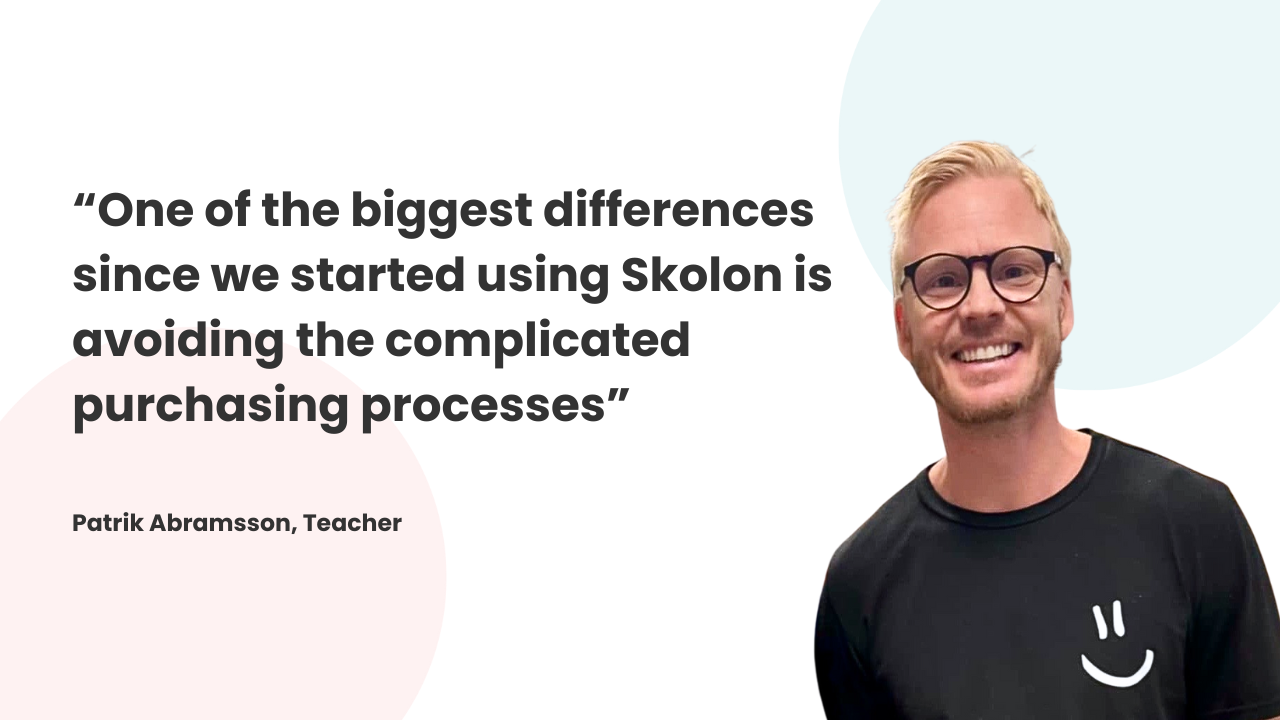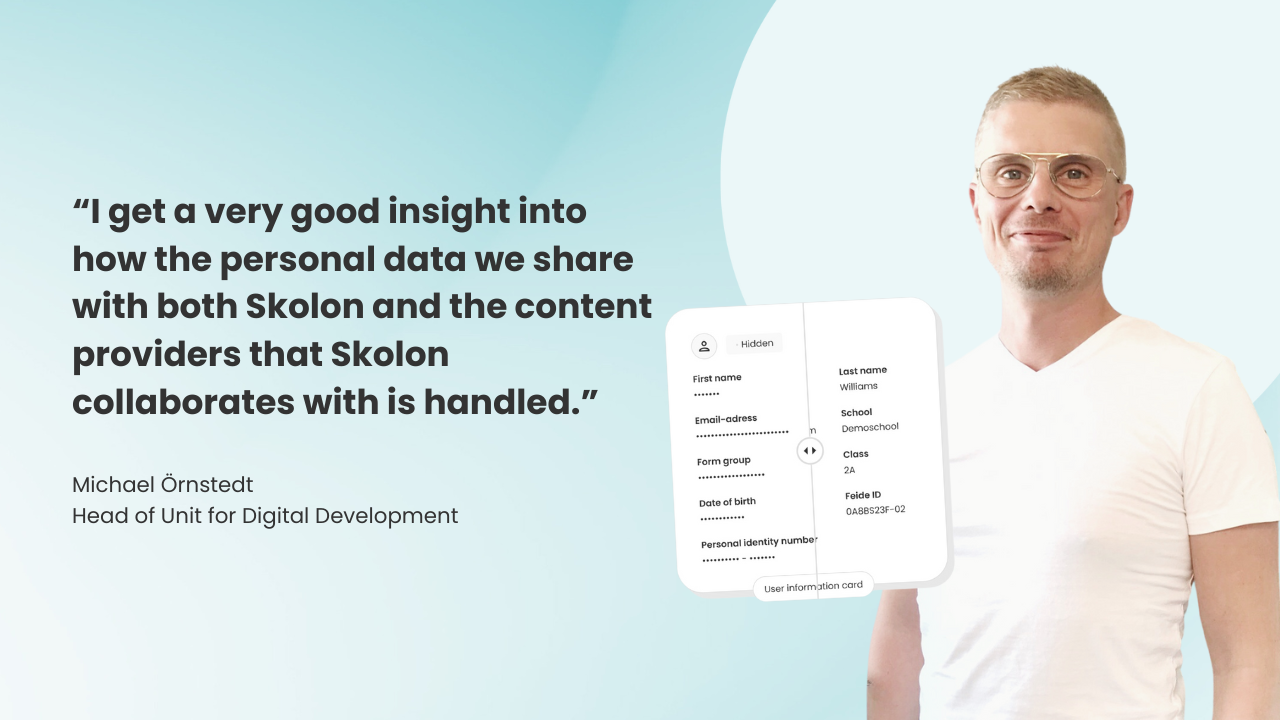Equal education and higher quality teaching – Ystad Municipality expands its use of Skolon


In Ystad Municipality, Skolon has been part of upper secondary students’ everyday lives for several years now. Having heard about students’ progress and a desire from the schools themselves, the municipality felt that the time had come for further expansion.
“We’ve been able to follow our upper secondary schools and have seen how they’ve developed together with Skolon, so we felt that the organisation was now ready to use Skolon at compulsory school level, too,” says Anki Demred Klinga, Digital Development Manager at Ystad Municipality.
In Ystad Municipality, Skolon has been part of teaching for some time now. However, this has primarily involved upper secondary students. Having been given several demonstrations of the digital platform and having discussed the system with head teachers, the municipality has now chosen to use Skolon at compulsory schools, too.
There is already a digital development plan at school level that the municipality’s Digital Development Manager, Anki Demred Klinga, has drawn up for preschool and compulsory school levels. This states that there should be more strategic responsibility at administrative level for looking at which resources can be used in education.
“A big part of this is that we will look at how digitalisation will help streamline administration for teachers, and we think this is something Skolon could help us with,” says Anki.
The ability to offer a wealth of resources
Anki takes a particularly positive view of the fact that, by using Skolon, the municipality can make life easier for teachers with their heavy workloads, and the real advantage is that they get access to all the teaching resources they need in one place.
“To begin with, I believe that what teachers will appreciate most is having everything in one convenient place, and that Skolon will bring added value in their work. Then, once they become more familiar with what it involves, they will particularly appreciate functionality such as deep links, as these help to structure work conveniently for students. The ability to offer our teachers the wealth of resources available on the digital market and the way they are presented so clearly are of course major advantages of using Skolon.”
Equal education and higher quality teaching
Anki believes that there will be advantages for students, too, as all students can get access to equal education wherever they are. She also says that digitalising education involves enhancing the quality of teaching.
“Although we already have a digital development plan for the municipality and the schools have local digital development plans, there can sometimes be differences between individual teachers and individual classrooms in terms of how they work digitally. We hope that Skolon will enable us to reduce the inequalities between schools and teachers. There are also endless opportunities for schools to continue working with digitalisation. We’ve focused on making classroom teaching digital, but at school level we want to be able to reduce teachers’ administrative workload and streamline our digital processes. Our aim is that both teachers in the classroom and we at administrative level should be able to make better use of the data that digitalisation can offer, to find out how we can reach the next level.”
Educational and financial benefits
Anki also believes that Skolon will bring both educational and financial benefits for the municipality.
“Thanks to Skolon, we get clear statistics about which resources we are using and how we can optimise our use and get the most out of these resources. I think this is interesting at both school level and municipality level.”
The digital tools included in Skolon come from providers of all sizes, all of which have one thing in common: they create digital tools that are good for education. And for Anki, it is a clear benefit that the selection of digital resources does not need to be so different compared with the choice of analogue resources – the important thing is to establish a vision of what they want to achieve, before then carrying out evaluations and seeing the results.
“When it comes to resources, I’m thinking about the added value we look for in digital resources. It shouldn’t just be a book in a digital format or a PDF copy that you can’t do anything with. Digital resources can offer interactivity, with everything from short movie clips and audio clips, to writing little notes, summaries of paragraphs and so on, which takes things to a whole new level. Digitalisation in schools should be seamless and straightforward. Just like we talk today about how electricity should work, I believe that digitalisation should also work in the classroom. And that it should be a natural, effective way to achieve students’ objectives.”
Information
Share this story
Subscribe
Would you like our newest articles delivered to your inbox? Sign up now!
In Ystad Municipality, Skolon has been part of upper secondary students’ everyday lives for several years now. Having heard about students’ progress and a desire from the schools themselves, the municipality felt that the time had come for further expansion.
“We’ve been able to follow our upper secondary schools and have seen how they’ve developed together with Skolon, so we felt that the organisation was now ready to use Skolon at compulsory school level, too,” says Anki Demred Klinga, Digital Development Manager at Ystad Municipality.
In Ystad Municipality, Skolon has been part of teaching for some time now. However, this has primarily involved upper secondary students. Having been given several demonstrations of the digital platform and having discussed the system with head teachers, the municipality has now chosen to use Skolon at compulsory schools, too.
There is already a digital development plan at school level that the municipality’s Digital Development Manager, Anki Demred Klinga, has drawn up for preschool and compulsory school levels. This states that there should be more strategic responsibility at administrative level for looking at which resources can be used in education.
“A big part of this is that we will look at how digitalisation will help streamline administration for teachers, and we think this is something Skolon could help us with,” says Anki.
The ability to offer a wealth of resources
Anki takes a particularly positive view of the fact that, by using Skolon, the municipality can make life easier for teachers with their heavy workloads, and the real advantage is that they get access to all the teaching resources they need in one place.
“To begin with, I believe that what teachers will appreciate most is having everything in one convenient place, and that Skolon will bring added value in their work. Then, once they become more familiar with what it involves, they will particularly appreciate functionality such as deep links, as these help to structure work conveniently for students. The ability to offer our teachers the wealth of resources available on the digital market and the way they are presented so clearly are of course major advantages of using Skolon.”
Equal education and higher quality teaching
Anki believes that there will be advantages for students, too, as all students can get access to equal education wherever they are. She also says that digitalising education involves enhancing the quality of teaching.
“Although we already have a digital development plan for the municipality and the schools have local digital development plans, there can sometimes be differences between individual teachers and individual classrooms in terms of how they work digitally. We hope that Skolon will enable us to reduce the inequalities between schools and teachers. There are also endless opportunities for schools to continue working with digitalisation. We’ve focused on making classroom teaching digital, but at school level we want to be able to reduce teachers’ administrative workload and streamline our digital processes. Our aim is that both teachers in the classroom and we at administrative level should be able to make better use of the data that digitalisation can offer, to find out how we can reach the next level.”
Educational and financial benefits
Anki also believes that Skolon will bring both educational and financial benefits for the municipality.
“Thanks to Skolon, we get clear statistics about which resources we are using and how we can optimise our use and get the most out of these resources. I think this is interesting at both school level and municipality level.”
The digital tools included in Skolon come from providers of all sizes, all of which have one thing in common: they create digital tools that are good for education. And for Anki, it is a clear benefit that the selection of digital resources does not need to be so different compared with the choice of analogue resources – the important thing is to establish a vision of what they want to achieve, before then carrying out evaluations and seeing the results.
“When it comes to resources, I’m thinking about the added value we look for in digital resources. It shouldn’t just be a book in a digital format or a PDF copy that you can’t do anything with. Digital resources can offer interactivity, with everything from short movie clips and audio clips, to writing little notes, summaries of paragraphs and so on, which takes things to a whole new level. Digitalisation in schools should be seamless and straightforward. Just like we talk today about how electricity should work, I believe that digitalisation should also work in the classroom. And that it should be a natural, effective way to achieve students’ objectives.”
Share this story
Subscribe
Would you like our newest articles delivered to your inbox? Sign up now!


